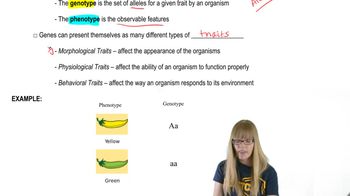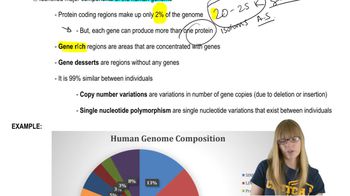The genetic difference between two Drosophila species, D. heteroneura and D. silvestris, as measured by nucleotide diversity, is about 1.8 percent. The difference between chimpanzees (Pan troglodytes) and humans (H. sapiens) is about the same, yet the latter species is classified in a different genera. In your opinion, is this valid? Explain why.
Table of contents
- 1. Introduction to Genetics51m
- 2. Mendel's Laws of Inheritance3h 37m
- 3. Extensions to Mendelian Inheritance2h 41m
- 4. Genetic Mapping and Linkage2h 28m
- 5. Genetics of Bacteria and Viruses1h 21m
- 6. Chromosomal Variation1h 48m
- 7. DNA and Chromosome Structure56m
- 8. DNA Replication1h 10m
- 9. Mitosis and Meiosis1h 34m
- 10. Transcription1h 0m
- 11. Translation58m
- 12. Gene Regulation in Prokaryotes1h 19m
- 13. Gene Regulation in Eukaryotes44m
- 14. Genetic Control of Development44m
- 15. Genomes and Genomics1h 50m
- 16. Transposable Elements47m
- 17. Mutation, Repair, and Recombination1h 6m
- 18. Molecular Genetic Tools19m
- 19. Cancer Genetics29m
- 20. Quantitative Genetics1h 26m
- 21. Population Genetics50m
- 22. Evolutionary Genetics29m
15. Genomes and Genomics
Comparative Genomics
Problem 13
Textbook Question
We all carry about 20,000 genes in our genome. So far, patents have been issued for more than 6000 of these genes. Do you think that companies or individuals should be able to patent human genes? Why or why not?
 Verified step by step guidance
Verified step by step guidance1
Understand the concept of gene patenting: Gene patenting refers to the legal protection granted to companies or individuals for isolated and identified sequences of human DNA, allowing them exclusive rights to use or commercialize these sequences.
Consider the ethical implications: Reflect on whether genes, as naturally occurring elements of the human body, should be owned or controlled by any entity, and how this might affect research, healthcare, and access to genetic testing.
Evaluate the impact on scientific research: Think about how gene patents might encourage or hinder innovation, collaboration, and the development of new treatments or diagnostic tools.
Analyze the legal and economic aspects: Consider how patents provide incentives for investment in biotechnology but may also lead to monopolies and increased costs for patients and researchers.
Formulate your position by weighing the pros and cons: Decide if you believe gene patenting promotes progress and benefits society or if it restricts access to fundamental biological information that should remain in the public domain.
 Verified video answer for a similar problem:
Verified video answer for a similar problem:This video solution was recommended by our tutors as helpful for the problem above
Video duration:
40sPlay a video:
Was this helpful?
Key Concepts
Here are the essential concepts you must grasp in order to answer the question correctly.
Gene Patentability
Gene patentability refers to the legal ability to claim ownership over isolated or modified human genes. It involves determining whether naturally occurring genetic sequences can be patented or if only synthetic inventions related to genes qualify. This concept is central to debates on intellectual property rights in genetics.
Recommended video:
Guided course

Mapping Genes
Ethical Considerations in Genetics
Ethical considerations address the moral implications of patenting human genes, including issues of accessibility, fairness, and the impact on research and healthcare. It questions whether genes, as natural parts of human biology, should be owned or controlled by private entities.
Recommended video:
Guided course

Descriptive Genetics
Impact of Gene Patents on Research and Medicine
Gene patents can influence scientific research and medical innovation by either encouraging investment through protection or hindering progress due to restricted access. Understanding this impact helps evaluate the benefits and drawbacks of allowing gene patents in advancing healthcare.
Recommended video:
Guided course

Human Genome Composition
Related Videos
Related Practice
Textbook Question
504
views


